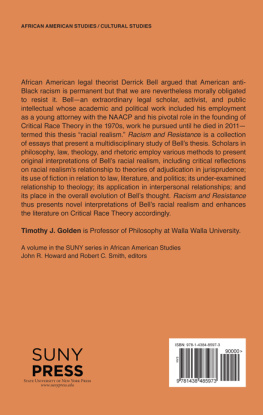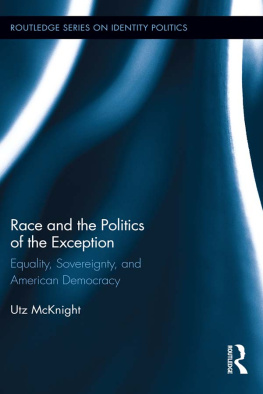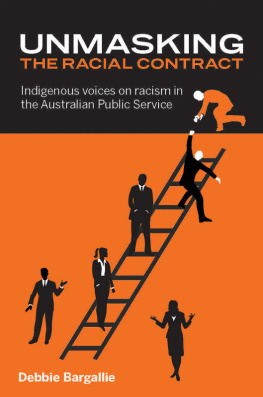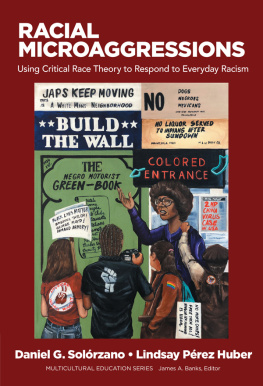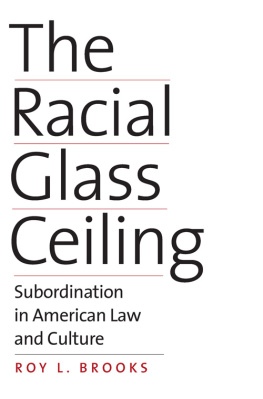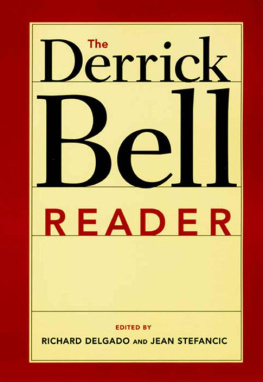Chapter 1
The Last Decade of Derrick Bells Thought
G EORGE H. T AYLOR
In the fall of 2006, Derrick Bell returned to his alma mater and my home institution, the School of Law at the University of Pittsburgh, to teach for the semester. On the basis of some writing I had undertaken on his work, As in the class, the topic of religion became a persistent thread wending across Bells writing and speeches, a development of interest in itself. But, I shall contend, Bells attention to religion also extended his insight into a theme constant across his writings: the perdurance of racist beliefs in American society. Characterization of racism as a racist faitha characterization that includes but does not limit faith to religious faithdeepens our understanding of its resilience. Bells work in his last decade adds to our appreciation that his message was not simply an incisive contribution to the struggles of a prior generation but a missive of continuing vitality for the struggles toward racial justice in the changing landscapes of today and tomorrow. Bells thought here provides another exemplification of his contributions to critical race theory and critical race methodology.
I proceed in three parts. The first two aim to be at once descriptive and to enrich our awareness of the significance of Bells work in the last decade of his authorship. The third steps back and takes a more evaluative perspective. appraises how we can honor Bell by building on his work for the future.
I. Three Themes on Religion
B ELLS R ELIGIOUS F AITH
In his final decade, three themes involving religion arise prominently in Bells work. The first is his own religious faith. Anticipated in prior work such as Gospel Choirs, Bells reflections on his own faith become most overt in Ethical Ambition. In the course of a work on the challenges of an ethical life, Bell includes a chapter on his evolving faith. Less concerned about doctrinal orthodoxy or theological formulas, Bells faith provides for him a deep grounding, an anchor in the storm. When asked how he has maintained his commitment to social action promoting racial justice in the midst of the turbulence and resistance of opposing forces, Bell replies:
I have relied on my faith. Particularly in hard times, my Christian faith provides reassurance that is unseen but no less real. It never fails to give me the fortitude I need when opposing injustice despite the almost certain failure of my action to persuade those in authority to alter their plans or policies. For me it is my most powerful resource.
Bells faith provides nurturance, the reserves with which to continue. This faith, Bell writes, resonates in the power of the spirituals that he is so drawn to: Keep your hand on the plow. Hold on. His faith also gives him some confidence that he is pursuing the just path toward the right ends.
Along similar lines Bell frequently quotes the following passage from Patricia Williams:
Blacks always believed in rights in some larger, mythological senseas a pantheon of possibility. It is in this sense that blacks believed in rights so much and so hard that we gave them life where there was none before; held onto them, put the hope of them into our wombs, mothered them, not the notion of them; we nurtured rights and gave rights life. And this was not the dry process of reification, from which life is drained and reality fades as the cement of conceptual determinism hardens round, but its opposite. This was the story of the Phoenix; the parthenogenesis of unfertilized hope.
The Phoenix, Williams explains, is the resurrection of life from ashes four hundred years old.
For present purposes, I take two points from Bells frequent citation of Williams. First, Bell is not alone among critical race scholars in the recourse to notions of some deep-seated faith or hope. Indeed, I would claim that these kinds of references are a central contribution of critical race theory. In contrast to those who argue that rights are simply a social construction that a society can grant or withdraw, Although the resource upon which Bell relies derives from his Christian faith, Bell does not insist that this resource can be located within Christian faith alone. I set aside the question whether this resource should or should not be described as best or solely located within Christianity. The point is that Bellas others within critical race theoryfind a deep enduring resource within humanity that can be called upon as a source both of sustenance and of determination of the just. For reasons I shall pursue, I will describe the human sensibility to this resource as a faith, something potentially broader than but inclusive of Christian faith.
R ACIST F AITH
If the first theme involving religion in Bells later work is his articulation of the deep positive value of his personal religious faith, the second theme moves in quite an opposite direction. Why, Bell queries, have most racists claimed a Christian faith?
Historical and theological responses are available to all these linkages between Christianity and racism.
As throughout his work, Bell recognizes fully that the goal of eliminating racism is an endless challenge. Most racist Christians, for instance, will not find convincing the intellectual theological arguments about the limitations of their Christian understandings. And ultimately, this resistance is core to the importance of Bells inquiry into the relationship between faith and racism. For Bell, a primary insight of this decade is that he must add to his prior focus on the economic, political, and cultural dimensions of racism the religious basis for racism as well.
In appraising Bells theme about why many racists claim a Christian faith, we have seen that one area of inquiry lies in examining the degree to which a racist faith may or may not legitimately derive support for its stance within Christianity. I am less interested in that specific question. Instead, I want to focus on Bells perceptiveness, building on Kelsey, that the faith character of racism is not defined or limited by its sources in Christianity. Like Bells faiththough to very different endsa racist faith offers deep roots, deep grounding; it is not easily dislodged or refuted. The racist faith is also a causal origin of racism and in that regard must be added to racisms cultural, psychological, and economic foundations. The racist faith is not simply an ideological justification for beliefs derived on other, more material bases. The racist faith adds a materiality of its own. Individuals and groups do not act simply on the basis of economic interests; they act on the basis of faith interests as well. For racism to be confronted in any adequate way, its faith character must be addressed also. As I shall develop with Bell, racism as a faith is a deep cognitive structure. Racism, Bell writes, is not simply a taint or bias, We are far from the Enlightenment project where reason would vanquish and eradicate superstitiona category into which religion was also placed. For good or for ill, the persistence of human faithsboth Bells stirring faith and racist faithsremains more enduring and foundational.
T HE J UXTAPOSITION BETWEEN F AITH AND R ELIGIOUS S TRUCTURE
As anticipated, the third theme attracting Bells attention to religion in his later thought involves the transposition between the positive, originating spirit of Christianity and its institutionalization, the difference between a faith and the organizational structure developed to perpetuate it. On this subject, Bell persistently draws upon an excerpt from Nikos Kazantzakiss novel, The Last Temptation of Christ. perhaps it is not surprising that a novel rather than a theological work provides his principal source here, although as we shall see Bell will refer to theology as well. In the Kazantzakis excerpt Bell cites, the setting is a scene following the Last Supper, when Jesus informs his disciples that he knows he must die. While other disciples bemoan Jesuss fate, one disciple, Jacob, reconciles himself to Jesuss end and promises that the disciples will work to ensure that Jesuss words shall not die with him.

